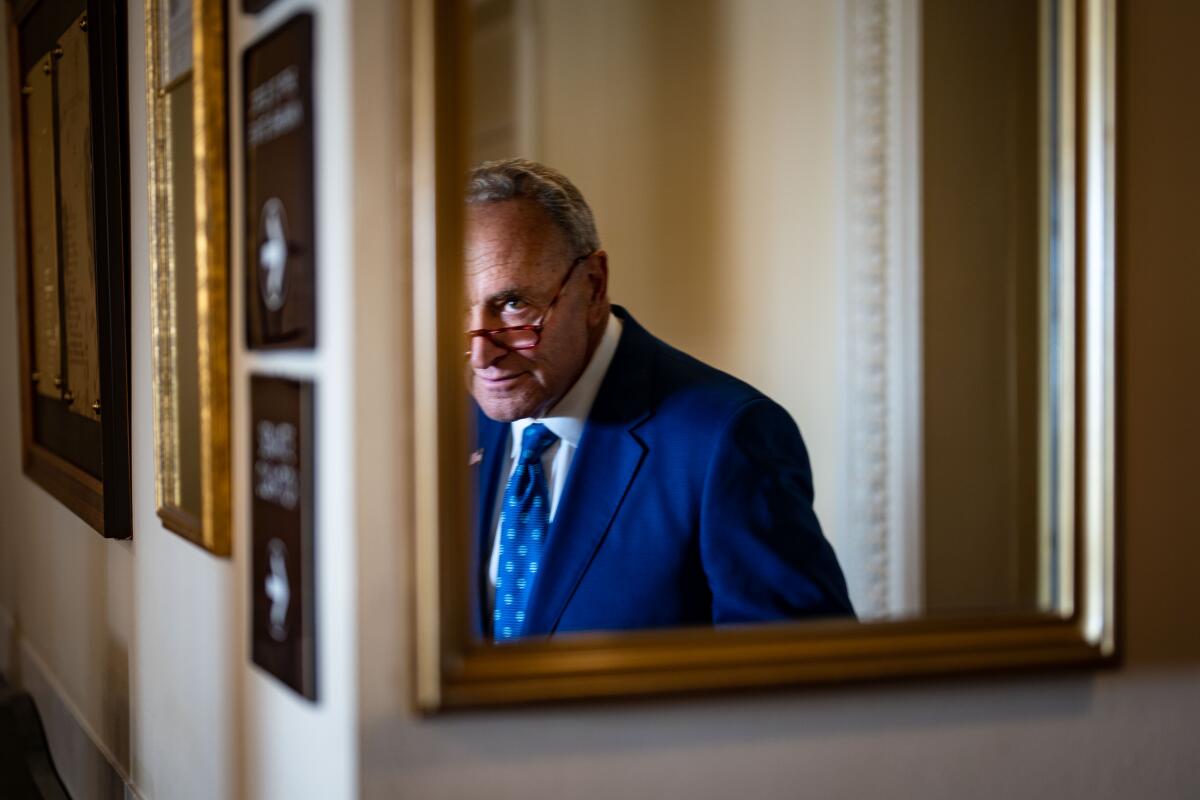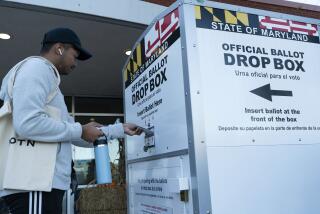Senators say vote on election reform bill unlikely until after midterms

- Share via
WASHINGTON — A bipartisan group of senators pushing legislation designed to prevent a repeat of the Jan. 6, 2021, attack on the U.S. Capitol say a vote on the package isn’t likely until after election day.
“We’ve talked about it as recently as [Wednesday] to try to find a window when we can take it up,” Sen. Benjamin L. Cardin (D-Md.) said in an interview. “There are still some open issues that need to be resolved, so we’re not quite ready to make that decision. But every day we wait makes it more likely it’s [going to happen in the] lame duck [session].”
The Senate returned from a summer recess this week, but is focusing largely on judicial nominations.
Majority Leader Charles E. Schumer (D-N.Y.) told reporters Wednesday that the chamber would vote on a marriage equality bill in the coming weeks. The Senate must also work with the House, which returns from its recess next week, to fund the government by Sept. 30.
And it’s possible Schumer could scrap the chamber’s two-week session in October to allow members who are up for reelection to campaign as the party hopes to expand its majority.
“I think the prevailing thought is that we will wait, that maybe we would wait until after the election,” Sen. Shelley Moore Capito (R-W.Va.) said. “I don’t know if we have time to deal with that before the election.”
A 16-member group of senators — seven Democrats and nine Republicans — released a pair of proposals in July.
The first bill, the Electoral Count Reform and Presidential Transition Improvement Act, would update the Electoral Count Act of 1887 to ensure the electoral votes Congress tallies are an accurate reflection of each state’s presidential vote. It would also clarify that the vice president has no authority to accept or reject electors, and make it harder for lawmakers to object to an elector or slate of electors. Currently a single member of the House and Senate may object. Under the bill, at least one-fifth of the members of both chambers must object.
The legislation came in response to the Jan. 6 mob of President Trump supporters, who tried to stop Congress’ official certification of the 2020 election results.
Trump had pressured Vice President Mike Pence to reject the election certification, something that had always been a formality of the vice president’s official duties. But legal experts said the vice president has no such authority and Pence refused.
The second measure, the Enhanced Election Security and Protection Act, would double the maximum penalty under federal law to two years in prison for anyone who threatens or intimidates election officials, poll watchers, voters or candidates.
It would also provide guidance to states to improve their absentee ballot processes and clarify that the law requires the preservation of electronic election records. It would stiffen the maximum penalties for people who willfully steal, destroy, conceal, mutilate or alter such records from $1,000 and one year in prison to $10,000 and two years in prison.
Senate Democrats originally sought to pass a sweeping package of voting rights legislation that would have created automatic and same-day voter registration, expanded early and absentee voting, and made election day a federal holiday. But that effort stalled in January with Senate Republicans united in opposition and a pair of moderate Democrats were unwilling to create a filibuster carve-out to pass the measure with only Democratic votes.
Though Senate Republicans attacked the broader Democratic bills, which they cast as a federal takeover of elections, a small group of Republicans agreed to hold talks on updating the Electoral Count Act.
On Aug. 3, Sen. Charles E. Grassley (R-Iowa) signaled his support for the bipartisan proposal, providing the needed 10th GOP vote to avoid a filibuster. His office confirmed Grassley is now a co-sponsor of the electoral count proposal.
Sen. Thom Tillis (R-N.C.), one of the GOP co-sponsors of the scaled-down bipartisan version, said it’s unclear whether the legislation would be voted on as a package or two bills. He said the electoral count provisions have broader support than the election security measures.
The House is reportedly drafting its own legislation, but no policy has been introduced yet. On Sunday, Rep. Jamie Raskin (D-Md.), a member of the select committee investigating Jan. 6, said on CBS’ “Face the Nation” that the Senate measure was “a good first start.”
“We want to take a much broader view,” Raskin told host Major Garrett.
Raskin said Congress should address “Donald Trump’s attack on the entire electoral college process and the entire democratic process, from the counties and the towns and the cities, through the states, all the way up to the federal government.”
“I think we have got to defend the right to vote and democracy itself,” he added. “I think we need to look far more systematically at what Donald Trump was trying to do.”
Senators were divided on whether they thought the House should attempt to strengthen the package.
“Obviously, I would have liked for our group in the Senate to have gone farther than just [electoral college] reform,” said Sen. Christopher S. Murphy (D-Conn.). “I think the current system has too many vulnerabilities in it.”
Sen. Lindsey Graham (R-S.C.), another GOP co-sponsor, said he believes there’s room to compromise with the House. “I just want to get something done,” he said.
But others said the Senate version was the best path forward to passage.
“I don’t think there’s time to really conference this,” Cardin said.
Sen. Mitt Romney (R-Utah), also a co-sponsor, warned against letting “perfection become the enemy of the good.”
More to Read
Get the L.A. Times Politics newsletter
Deeply reported insights into legislation, politics and policy from Sacramento, Washington and beyond. In your inbox twice per week.
You may occasionally receive promotional content from the Los Angeles Times.











